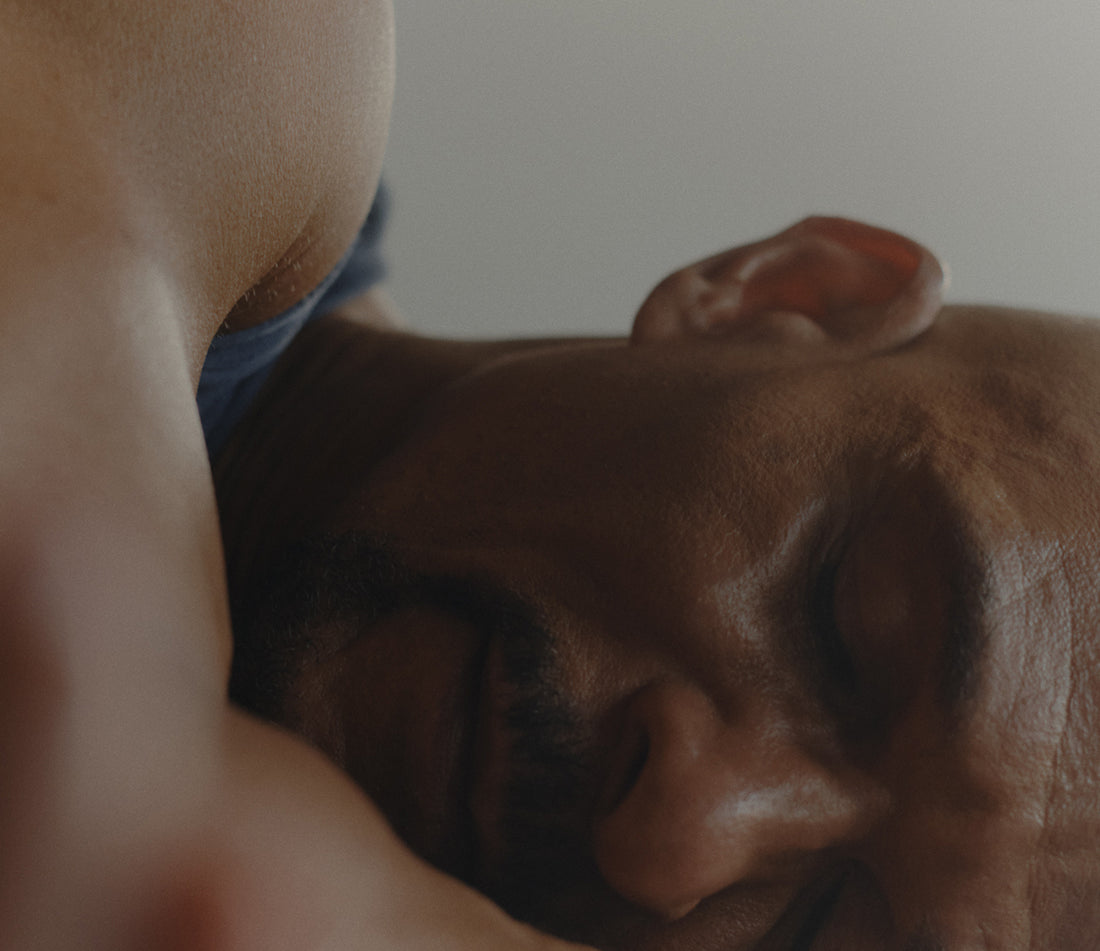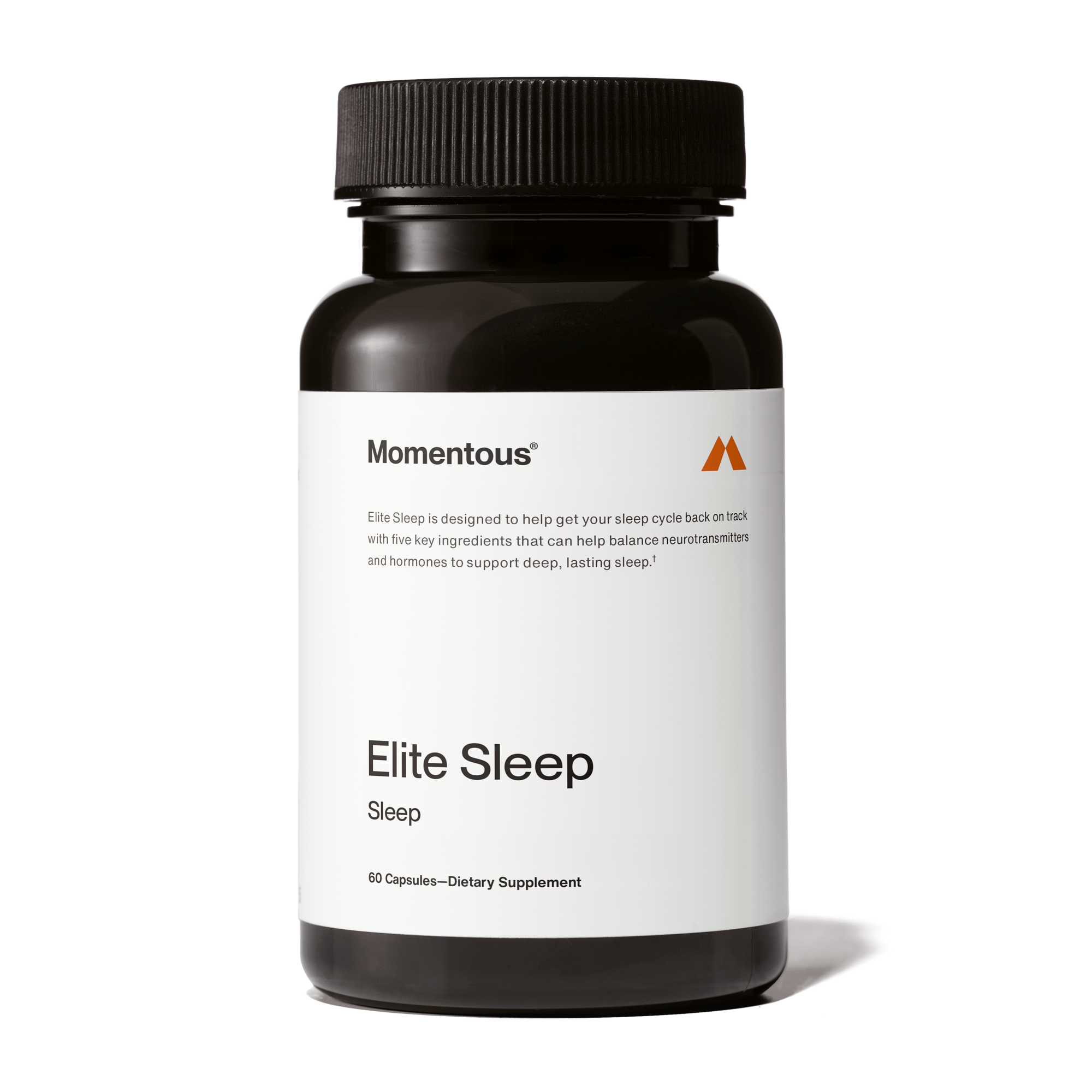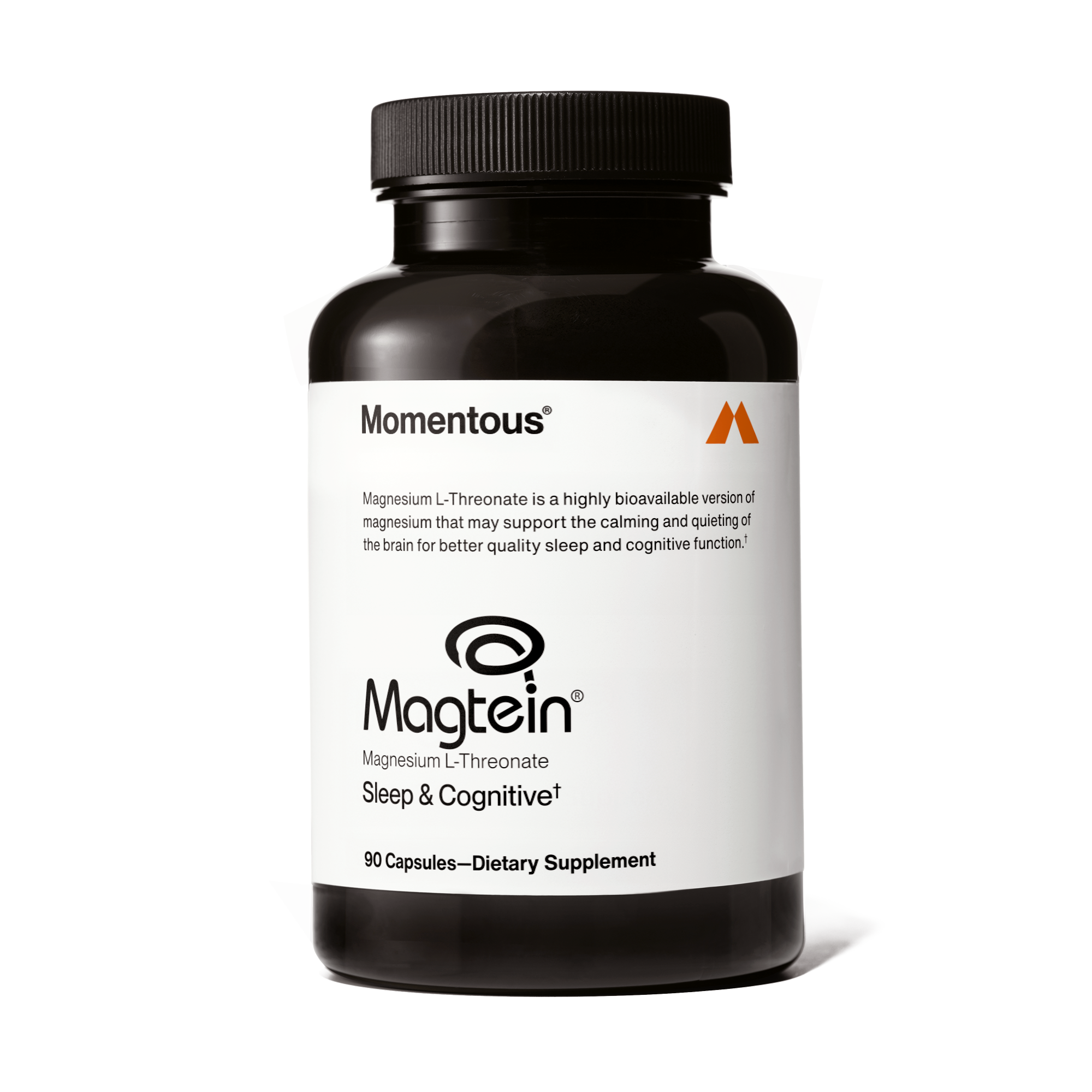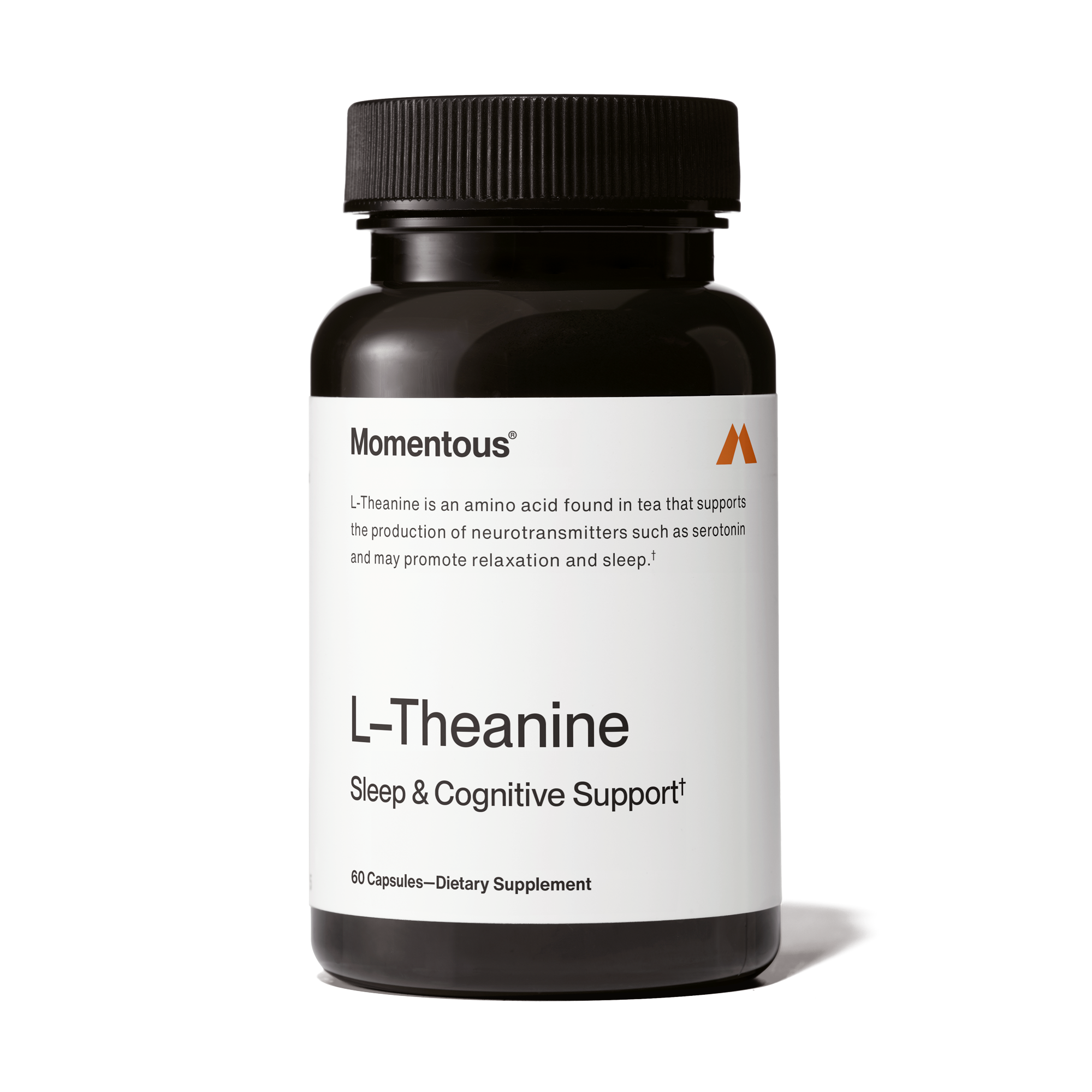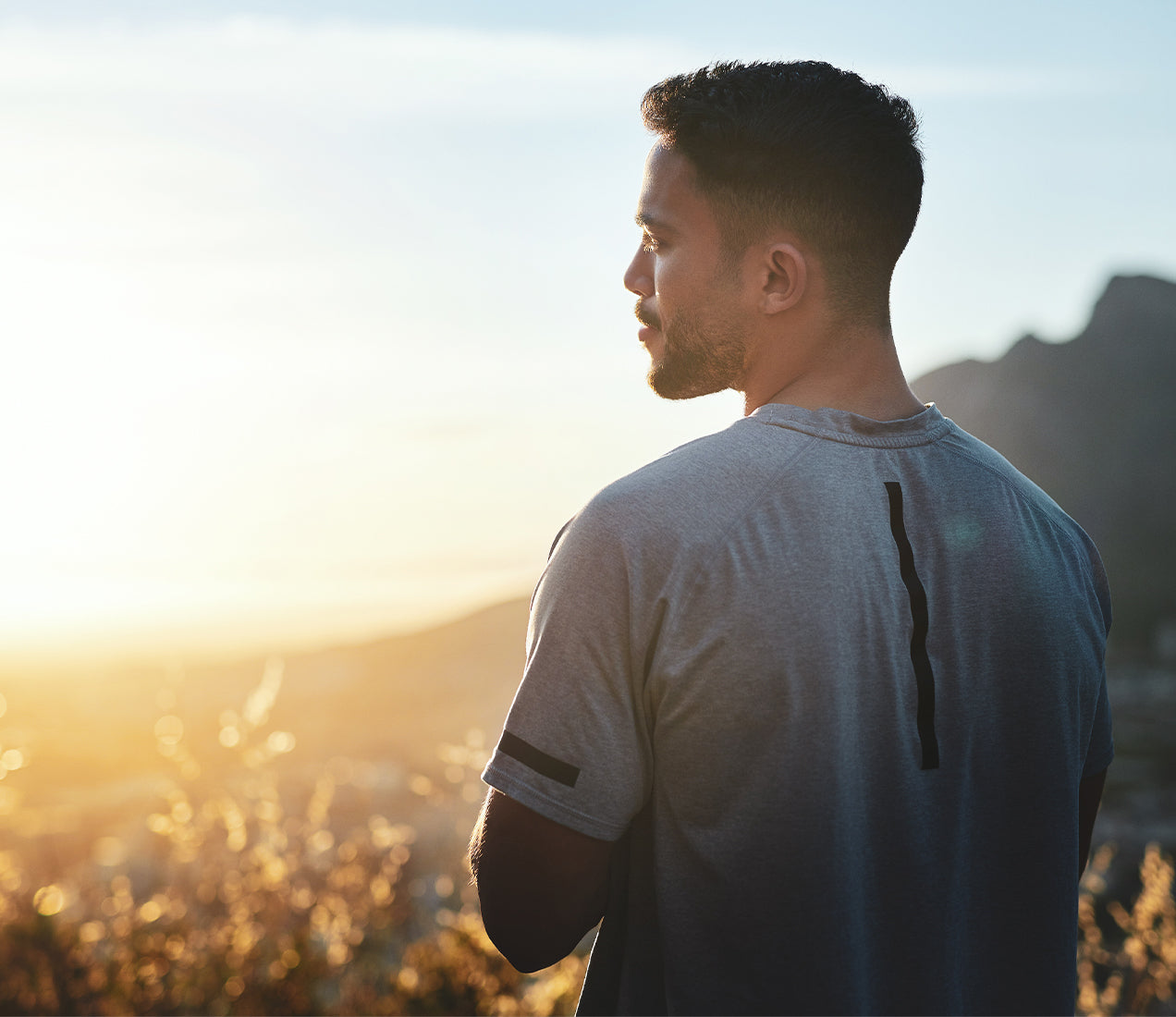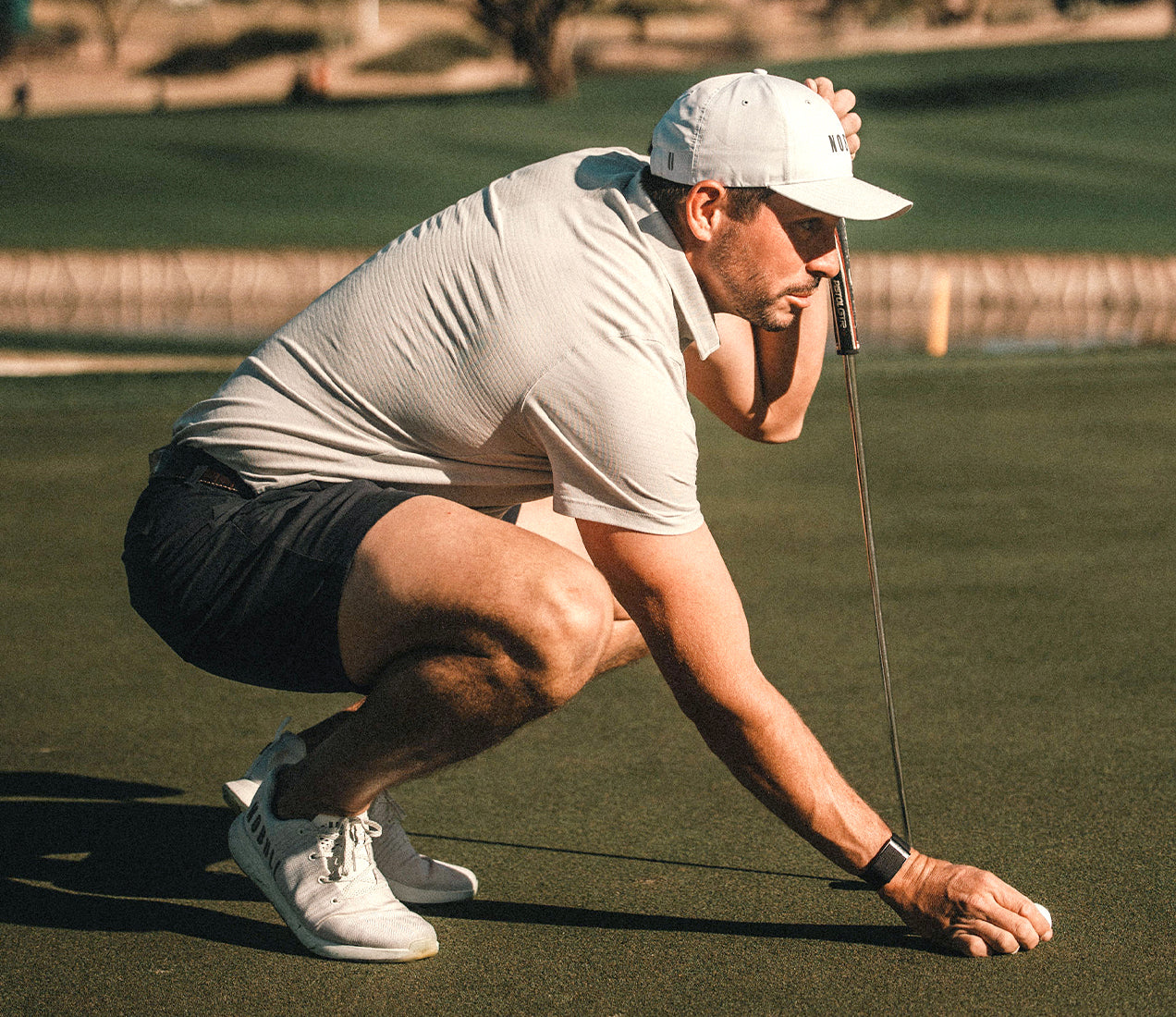Melatonin + calming botanicals to support restful, restorative sleep
Cognitive Function, Sleep Quality
Highly absorbable magnesium to support sleep, focus + brain health
Supports calm, focus, and healthy stress response
Getting enough quality sleep is essential for our overall health and well-being. But for a host of reasons, many people struggle to get a good night's sleep, which can seriously impact your physical and mental health. With this in mind, here are some practical tips to help you improve your sleep and get the rest you need to function at your best:
Keep it cool
Your core temperature needs to drop two to three degrees before you fall asleep, so keeping your bedroom cool can make a big difference. The ideal temperature for sleep is between 60-67°F (15-19°C), so turn down the thermostat, use a fan, or open the window if your room is too warm. Interestingly, researchers have found that having a warm bath or shower before bed can promote better sleep (1).
Avoid blue light before bed
Blue light exposure from smartphones, tablets, and computer screens can interfere with your sleep by suppressing your body's natural production of melatonin, a hormone that helps regulate sleep (2). To reduce blue light exposure, limit your use of electronic devices before bed, use blue light-blocking glasses, and adjust your phone or computer screen color to warmer tones and lower brightness in the evening.
Hello sunshine
Good sleep starts early. If you can start every morning with early exposure to natural light it helps to balance your body's natural circadian rhythm (3). Try to get a minimum of 10 minutes of sunlight (at least 30 minutes on overcast days) within 60 minutes of waking up. A brisk morning walk can also help.
Take the right supplements
Supplements can provide significant benefits for your sleep routine when used correctly. The Foundational Sleep Bundle, containing Magnesium L-Threonate, Apigenin, and L-Theanine, can help you fall asleep faster, stay asleep longer, and wake up feeling refreshed. It is important to speak with a healthcare professional before taking any supplements to ensure they are safe for you and will not interact with any medications you take.
Skip the late-night snacks
It can be tempting to grab a late-night snack before bed. However, research shows that eating or drinking too much before bedtime can negatively impact sleep (4). It's best to avoid having anything to eat at least two hours before bedtime. If you're feeling the hunger pangs before bed, keep it to a light snack like a banana, a handful of nuts, or a glass of warm milk. If you're someone who exercises a lot, you might also want to try a high-protein recovery drink like Recover prior to bedtime to help you sleep soundly through the night.
Exercise at the right time
We know regular exercise can promote good quality sleep (5), but try avoiding exercising (especially high-intensity exercise) too close to bedtime as it can cause an increase in body temperature. It can also lead to a rise in endorphins, making it harder to unwind. Aim to finish your workout at least two to three hours before bedtime to give your body time to relax.
Find a moment of Zen
Finding ways to calm yourself before bed is a great way to help your body and mind prepare for sleep. Studies have shown that listening to calming music (6) and practicing relaxation techniques like deep breathing or light yoga can help you relax and fall asleep faster. Find a moment every night to center yourself before your head hits the pillow.
Keep to a routine
A consistent bedtime routine can signal to your body that it's time to sleep and this can help you get better sleep overall (7). Even a regular daily schedule will help you when it comes time to go to bed (8). Try to establish regular sleep and wake times, even on weekends, and follow the same relaxing bedtime routine each night.
Limit daily naps
Taking a quick snooze can boost various aspects of performance, such as reaction time, logical reasoning, and symbol recognition, even for those who are already well-rested (9). However, avoid napping after 3 p.m., as it can make it harder to fall asleep at night. Limiting naps to 20-30 minutes is best, otherwise you risk feeling groggy and disrupting your evening sleep schedule.
Coffee and caffeine intake
It's no secret that drinking too much caffeine can really mess with your sleep. That's because caffeine stimulates your central nervous system and can keep you feeling wired, making it harder for you to fall asleep and stay asleep (10). It's also a good idea to avoid other sources of caffeine, like energy drinks and chocolate, before bed. If you can't (or don't want to!) give up your coffee fix, try to limit your consumption and enjoy it earlier in the day.
Try Non-Sleep Deep Rest (NSDR)
NSDR is a relaxation technique that helps you get into a restorative state while your mind is still awake. It has two simple steps: first, relax, and then, focus intensely on one thing, like an image or sound. It's especially useful if you have difficulty slowing down at bedtime or feel anxious (11). There are a lot of guided NSDR meditations online, or you can create your own routine with your favorite calming image or sound.
Ditch the late-night drinks
Alcohol might help you fall asleep quickly, but it's not doing you any favors for your sleep quality. Booze can seriously disrupt your sleep, leaving you feeling groggy and unfocused the next day. It can also lead to an increased amount of wake-ups during the night and a disrupted sleep pattern (it blocks REM sleep) (12). If you want high-quality sleep, go easy on the drinks, especially before bed.
Use your bed appropriately
Ideally, you're only using your bed for sleep, rest, and intimacy. Spending time awake in bed while watching TV, answering work emails, or gaming can make it harder to fall asleep when you want to (13). If you are awake in bed for longer than 20 minutes, it is best to get up, leave the bedroom, and do something relaxing until you feel sleepy again. Associating your bed with sleep and only sleep will go a long way in improving your sleep patterns.
Create a perfect environment
Your bed, mattress, pillows, and bedding are all important parts of the sleep equation, so you'll want to ensure they're comfortable and supportive. Treat yourself to some high-quality bedding and a mattress that suits your preferences. Make sure your pillow cradles your neck and aligns your spine, too (14). As for your sheets, go for fabrics that feel great on your skin and keep you from overheating.
Sleep in darkness and avoid noise
Getting a good night's sleep starts with creating the right conditions in your bedroom. Make sure it's pitch black and silent so you can doze off in peace. Light (15) and noise (16) can mess with your body's natural sleep rhythm, so keep them at bay with some earplugs or a white noise machine.
Hopefully these tips and strategies have given you some ideas to improve your sleep and get a good night's rest. Remember, good sleep is the foundation of your health and well-being, so don't be afraid to experiment and find what works best for you. Sweet dreams!
----
(1) Horne, J. A., & Reid, A. J. (1985). Night-time sleep EEG changes following body heating in a warm bath. Electroencephalography and Clinical Neurophysiology, 60(2), 154–157.
(2) Lockley, S. W., Brainard, G. C., & Czeisler, C. A. (2003). High sensitivity of the human circadian melatonin rhythm to resetting by short wavelength light. The Journal of Clinical Endocrinology and Metabolism, 88(9), 4502–4505.
(3) Figueiro, M. G., Steverson, B., Heerwagen, J., Kampschroer, K., Hunter, C. M., Gonzales, K., Plitnick, B., & Rea, M. S. (2017). The impact of daytime light exposures on sleep and mood in office workers. Sleep Health, 3(3), 204–215.
(4) Crispim, C. A., Zimberg, I. Z., dos Reis, B. G., Diniz, R. M., Tufik, S., & de Mello, M. T. (2011). Relationship between food intake and sleep pattern in healthy individuals. Journal of Clinical Sleep Medicine: JCSM: Official Publication of the American Academy of Sleep Medicine, 7(6), 659–664.
(5) Kredlow, M.A., Capozzoli, M.C., Hearon, B.A. et al. (2015). The effects of physical activity on sleep: a meta-analytic review. Journal of Behavioral Medicine, 38, 427–449.
(6) de Niet, G., Tiemens, B., Lendemeijer, B., & Hutschemaekers, G. (2009). Music-assisted relaxation to improve sleep quality: meta-analysis. Journal of Advanced Nursing, 65(7), 1356–1364.
(7) Manber, R., Bootzin, R. R., Acebo, C., & Carskadon, M. A. (1996). The effects of regularizing sleep-wake schedules on daytime sleepiness. Sleep, 19(5), 432–441.
(8) Monk, T. H., Reynolds, C. F., 3rd, Buysse, D. J., DeGrazia, J. M., & Kupfer, D. J. (2003). The relationship between lifestyle regularity and subjective sleep quality. Chronobiology International, 20(1), 97–107.
(9) Milner, C. E., & Cote, K. A. (2009). Benefits of napping in healthy adults: impact of nap length, time of day, age, and experience with napping. Journal of Sleep Research, 18(2), 272–281.
(10) Clark, I., & Landolt, H. P. (2017). Coffee, caffeine, and sleep: A systematic review of epidemiological studies and randomized controlled trials. Sleep Medicine Reviews, 31, 70–78.
(11) Staines, A. C., Broomfield, N., Pass, L., Orchard, F., & Bridges, J. (2022). Do non-pharmacological sleep interventions affect anxiety symptoms? A meta-analysis. Journal of Sleep Research, 31(1), e13451.
(12) Ebrahim, I. O., Shapiro, C. M., Williams, A. J., & Fenwick, P. B. (2013). Alcohol and sleep I: effects on normal sleep. Alcoholism, Clinical and Experimental Research, 37(4), 539–549.
(13) Lastella, M., Rigney, G., Browne, M., & Sargent, C. (2020). Electronic device use in bed reduces sleep duration and quality in adults. Sleep and Biological Rhythms, 18(2), 121–129.
(14) Chun-Yiu, J. P., Man-Ha, S. T., & Chak-Lun, A. F. (2021). The effects of pillow designs on neck pain, waking symptoms, neck disability, sleep quality and spinal alignment in adults: A systematic review and meta-analysis. Clinical Biomechanics (Bristol, Avon), 85(105353), 105353.
(15) Cho, J. R., Joo, E. Y., Koo, D. L., & Hong, S. B. (2013). Let there be no light: the effect of bedside light on sleep quality and background electroencephalographic rhythms. Sleep Medicine, 14(12), 1422–1425.
(16) Omlin, S., Bauer, G. F., & Brink, M. (2011). Effects of noise from non-traffic-related ambient sources on sleep: review of the literature of 1990-2010. Noise & Health, 13(53), 299–309.


